Impact of Organisational Culture on TESCO: A Comprehensive Report
VerifiedAdded on 2022/12/17
|11
|3165
|36
Report
AI Summary
This report provides an in-depth analysis of organisational culture, its theoretical models, and its impact on employee motivation and overall effectiveness, using TESCO as a case study. The report explores the importance of culture in reducing conflicts and fostering a positive work environment. It examines various aspects of TESCO's culture, including language, attitudes, and values, and applies Charles Handy's cultural theories. The report highlights how effective communication and management styles, such as democratic leadership, contribute to improved organisational effectiveness. It also evaluates the role of culture in motivating employees, emphasizing both extrinsic and intrinsic methods. Overall, the report underscores the crucial role of organisational culture in achieving company goals and objectives, with a focus on practical strategies for improvement and success.
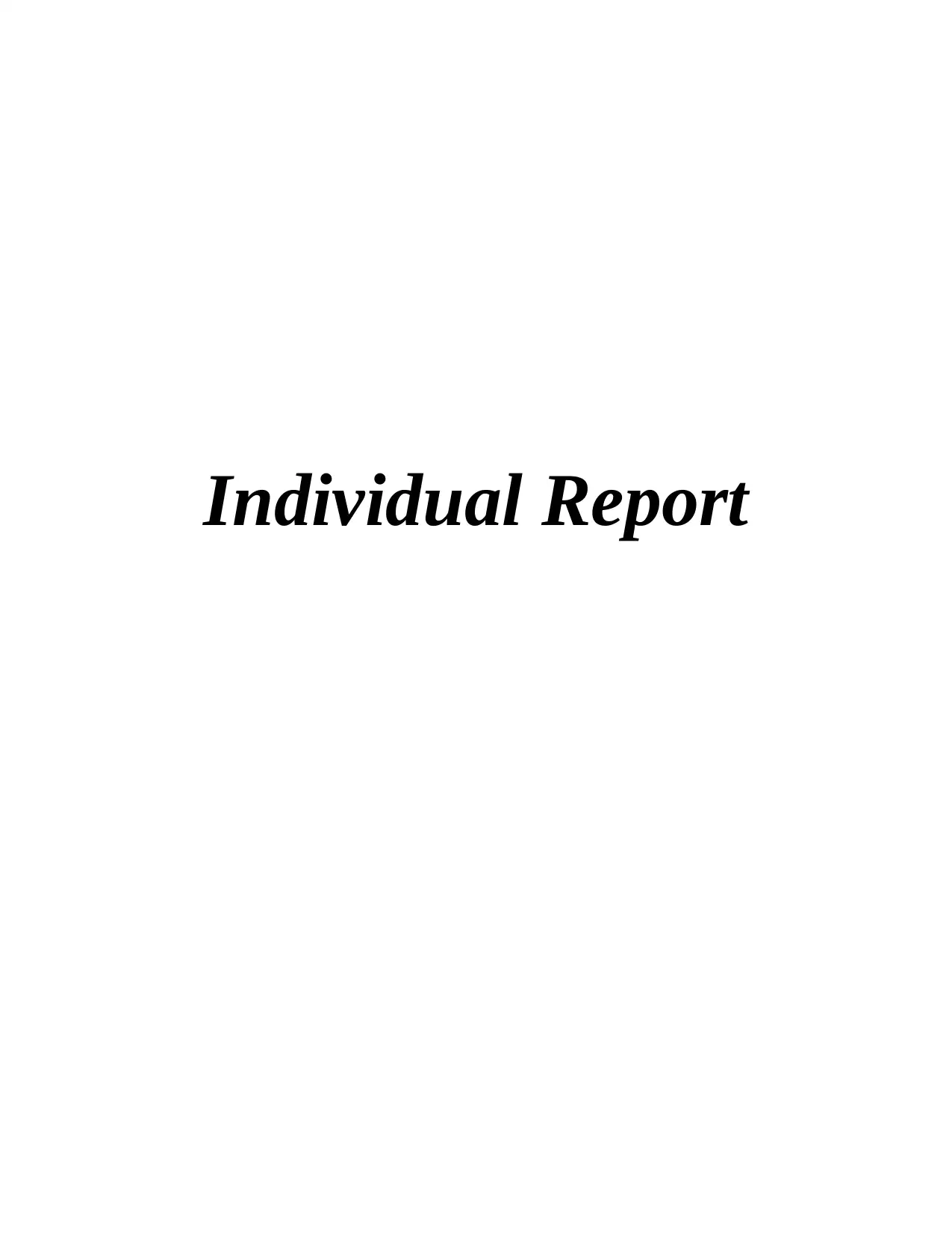
Individual Report
Paraphrase This Document
Need a fresh take? Get an instant paraphrase of this document with our AI Paraphraser
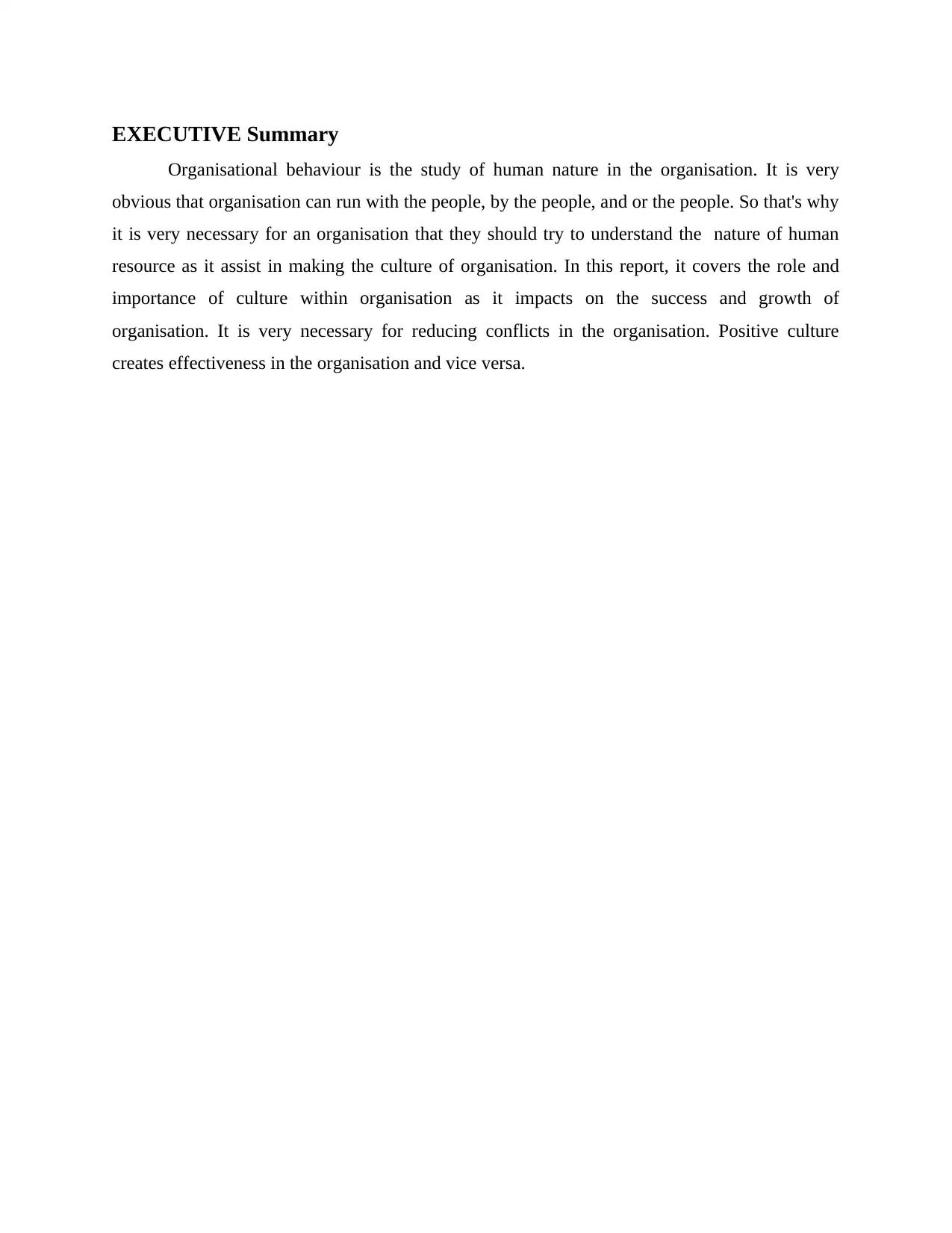
EXECUTIVE Summary
Organisational behaviour is the study of human nature in the organisation. It is very
obvious that organisation can run with the people, by the people, and or the people. So that's why
it is very necessary for an organisation that they should try to understand the nature of human
resource as it assist in making the culture of organisation. In this report, it covers the role and
importance of culture within organisation as it impacts on the success and growth of
organisation. It is very necessary for reducing conflicts in the organisation. Positive culture
creates effectiveness in the organisation and vice versa.
Organisational behaviour is the study of human nature in the organisation. It is very
obvious that organisation can run with the people, by the people, and or the people. So that's why
it is very necessary for an organisation that they should try to understand the nature of human
resource as it assist in making the culture of organisation. In this report, it covers the role and
importance of culture within organisation as it impacts on the success and growth of
organisation. It is very necessary for reducing conflicts in the organisation. Positive culture
creates effectiveness in the organisation and vice versa.
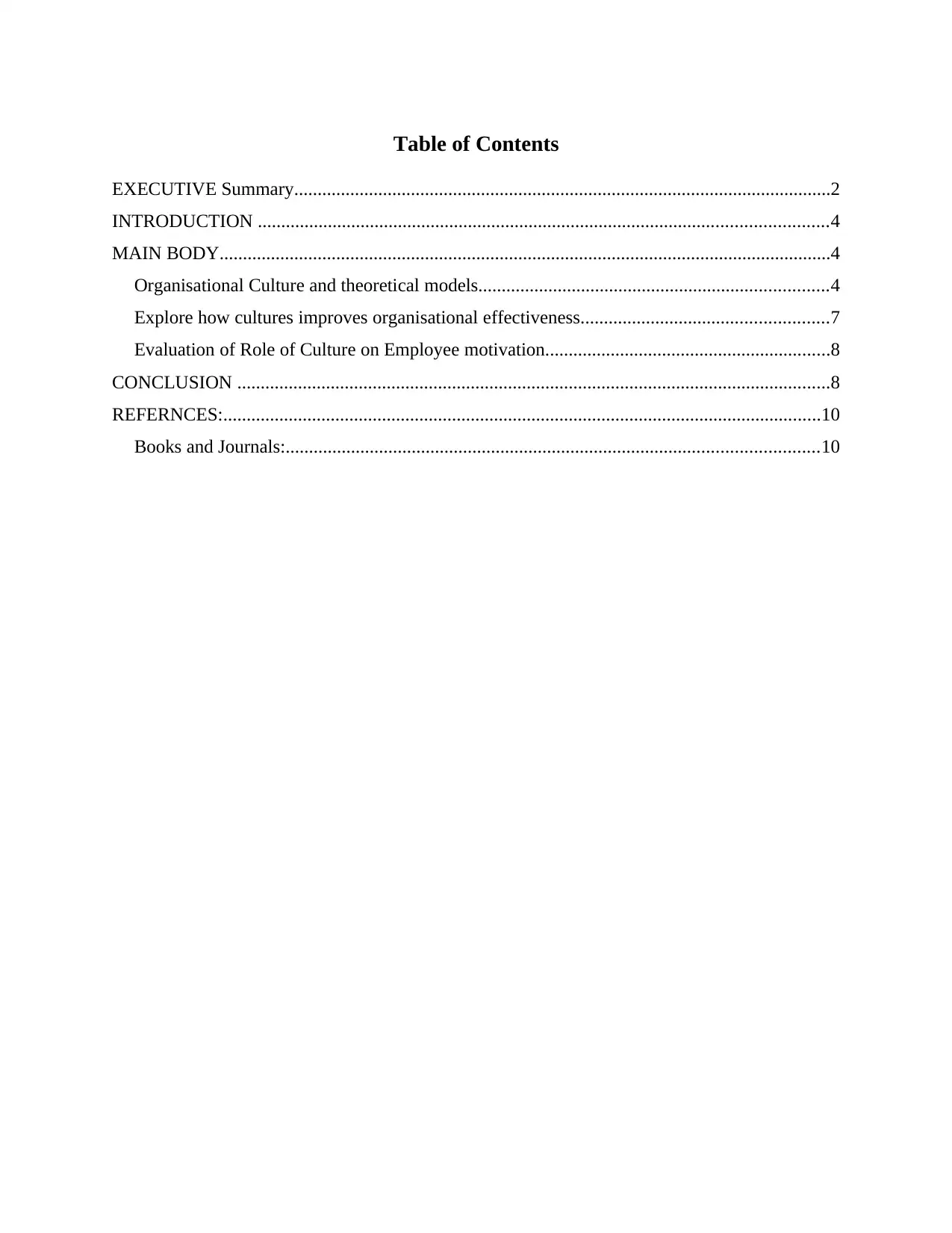
Table of Contents
EXECUTIVE Summary...................................................................................................................2
INTRODUCTION ..........................................................................................................................4
MAIN BODY...................................................................................................................................4
Organisational Culture and theoretical models...........................................................................4
Explore how cultures improves organisational effectiveness.....................................................7
Evaluation of Role of Culture on Employee motivation.............................................................8
CONCLUSION ...............................................................................................................................8
REFERNCES:................................................................................................................................10
Books and Journals:..................................................................................................................10
EXECUTIVE Summary...................................................................................................................2
INTRODUCTION ..........................................................................................................................4
MAIN BODY...................................................................................................................................4
Organisational Culture and theoretical models...........................................................................4
Explore how cultures improves organisational effectiveness.....................................................7
Evaluation of Role of Culture on Employee motivation.............................................................8
CONCLUSION ...............................................................................................................................8
REFERNCES:................................................................................................................................10
Books and Journals:..................................................................................................................10
⊘ This is a preview!⊘
Do you want full access?
Subscribe today to unlock all pages.

Trusted by 1+ million students worldwide
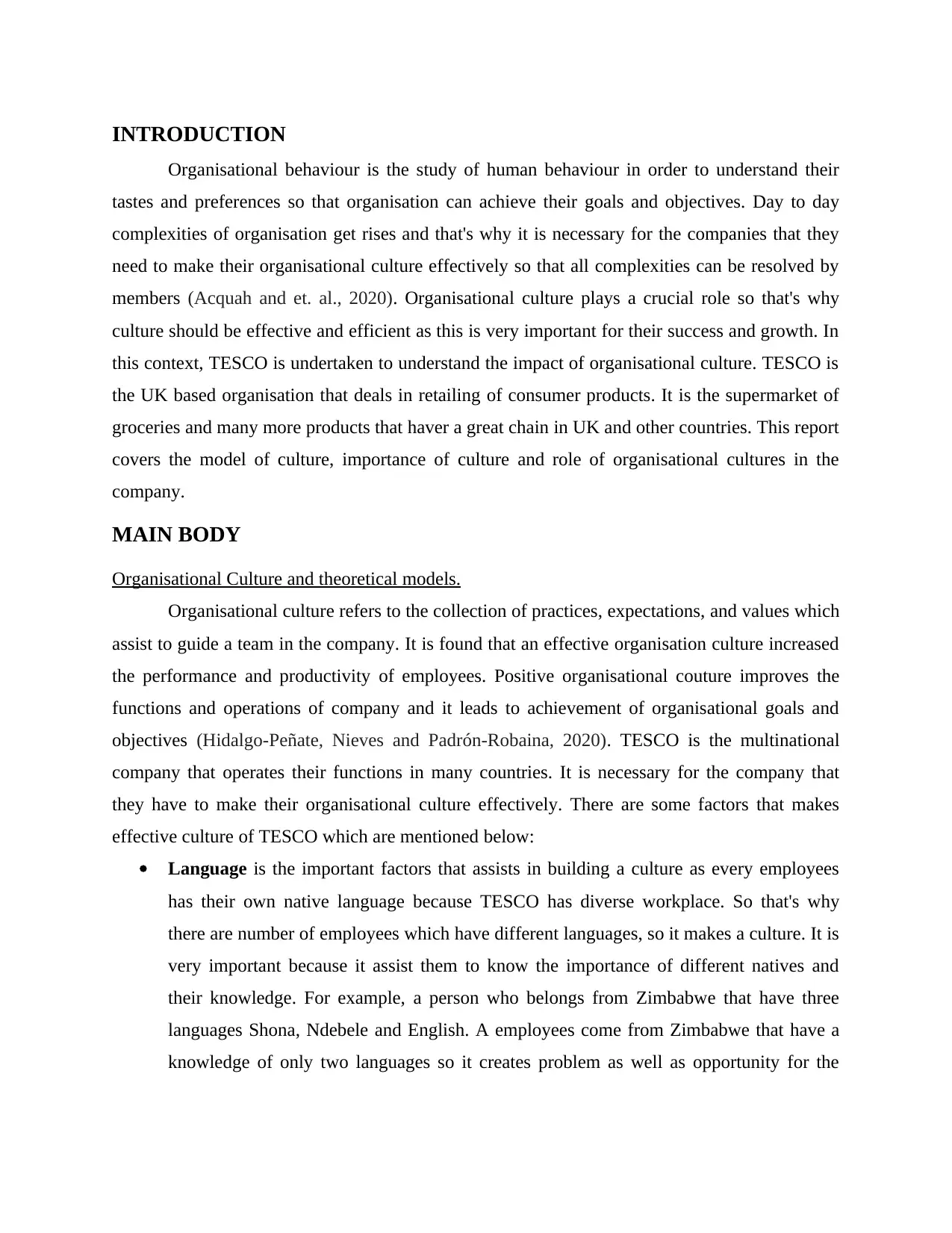
INTRODUCTION
Organisational behaviour is the study of human behaviour in order to understand their
tastes and preferences so that organisation can achieve their goals and objectives. Day to day
complexities of organisation get rises and that's why it is necessary for the companies that they
need to make their organisational culture effectively so that all complexities can be resolved by
members (Acquah and et. al., 2020). Organisational culture plays a crucial role so that's why
culture should be effective and efficient as this is very important for their success and growth. In
this context, TESCO is undertaken to understand the impact of organisational culture. TESCO is
the UK based organisation that deals in retailing of consumer products. It is the supermarket of
groceries and many more products that haver a great chain in UK and other countries. This report
covers the model of culture, importance of culture and role of organisational cultures in the
company.
MAIN BODY
Organisational Culture and theoretical models.
Organisational culture refers to the collection of practices, expectations, and values which
assist to guide a team in the company. It is found that an effective organisation culture increased
the performance and productivity of employees. Positive organisational couture improves the
functions and operations of company and it leads to achievement of organisational goals and
objectives (Hidalgo-Peñate, Nieves and Padrón-Robaina, 2020). TESCO is the multinational
company that operates their functions in many countries. It is necessary for the company that
they have to make their organisational culture effectively. There are some factors that makes
effective culture of TESCO which are mentioned below:
Language is the important factors that assists in building a culture as every employees
has their own native language because TESCO has diverse workplace. So that's why
there are number of employees which have different languages, so it makes a culture. It is
very important because it assist them to know the importance of different natives and
their knowledge. For example, a person who belongs from Zimbabwe that have three
languages Shona, Ndebele and English. A employees come from Zimbabwe that have a
knowledge of only two languages so it creates problem as well as opportunity for the
Organisational behaviour is the study of human behaviour in order to understand their
tastes and preferences so that organisation can achieve their goals and objectives. Day to day
complexities of organisation get rises and that's why it is necessary for the companies that they
need to make their organisational culture effectively so that all complexities can be resolved by
members (Acquah and et. al., 2020). Organisational culture plays a crucial role so that's why
culture should be effective and efficient as this is very important for their success and growth. In
this context, TESCO is undertaken to understand the impact of organisational culture. TESCO is
the UK based organisation that deals in retailing of consumer products. It is the supermarket of
groceries and many more products that haver a great chain in UK and other countries. This report
covers the model of culture, importance of culture and role of organisational cultures in the
company.
MAIN BODY
Organisational Culture and theoretical models.
Organisational culture refers to the collection of practices, expectations, and values which
assist to guide a team in the company. It is found that an effective organisation culture increased
the performance and productivity of employees. Positive organisational couture improves the
functions and operations of company and it leads to achievement of organisational goals and
objectives (Hidalgo-Peñate, Nieves and Padrón-Robaina, 2020). TESCO is the multinational
company that operates their functions in many countries. It is necessary for the company that
they have to make their organisational culture effectively. There are some factors that makes
effective culture of TESCO which are mentioned below:
Language is the important factors that assists in building a culture as every employees
has their own native language because TESCO has diverse workplace. So that's why
there are number of employees which have different languages, so it makes a culture. It is
very important because it assist them to know the importance of different natives and
their knowledge. For example, a person who belongs from Zimbabwe that have three
languages Shona, Ndebele and English. A employees come from Zimbabwe that have a
knowledge of only two languages so it creates problem as well as opportunity for the
Paraphrase This Document
Need a fresh take? Get an instant paraphrase of this document with our AI Paraphraser
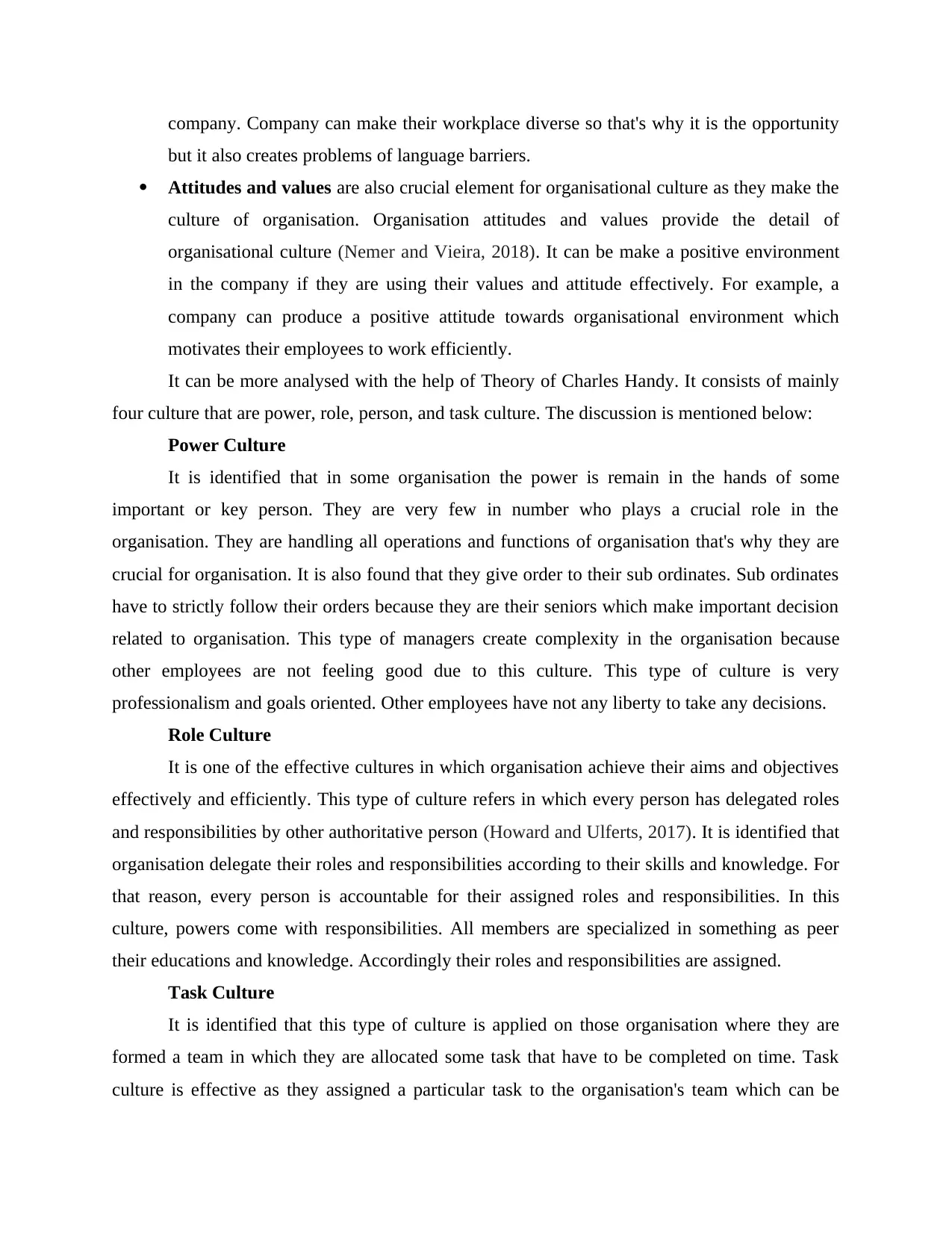
company. Company can make their workplace diverse so that's why it is the opportunity
but it also creates problems of language barriers.
Attitudes and values are also crucial element for organisational culture as they make the
culture of organisation. Organisation attitudes and values provide the detail of
organisational culture (Nemer and Vieira, 2018). It can be make a positive environment
in the company if they are using their values and attitude effectively. For example, a
company can produce a positive attitude towards organisational environment which
motivates their employees to work efficiently.
It can be more analysed with the help of Theory of Charles Handy. It consists of mainly
four culture that are power, role, person, and task culture. The discussion is mentioned below:
Power Culture
It is identified that in some organisation the power is remain in the hands of some
important or key person. They are very few in number who plays a crucial role in the
organisation. They are handling all operations and functions of organisation that's why they are
crucial for organisation. It is also found that they give order to their sub ordinates. Sub ordinates
have to strictly follow their orders because they are their seniors which make important decision
related to organisation. This type of managers create complexity in the organisation because
other employees are not feeling good due to this culture. This type of culture is very
professionalism and goals oriented. Other employees have not any liberty to take any decisions.
Role Culture
It is one of the effective cultures in which organisation achieve their aims and objectives
effectively and efficiently. This type of culture refers in which every person has delegated roles
and responsibilities by other authoritative person (Howard and Ulferts, 2017). It is identified that
organisation delegate their roles and responsibilities according to their skills and knowledge. For
that reason, every person is accountable for their assigned roles and responsibilities. In this
culture, powers come with responsibilities. All members are specialized in something as peer
their educations and knowledge. Accordingly their roles and responsibilities are assigned.
Task Culture
It is identified that this type of culture is applied on those organisation where they are
formed a team in which they are allocated some task that have to be completed on time. Task
culture is effective as they assigned a particular task to the organisation's team which can be
but it also creates problems of language barriers.
Attitudes and values are also crucial element for organisational culture as they make the
culture of organisation. Organisation attitudes and values provide the detail of
organisational culture (Nemer and Vieira, 2018). It can be make a positive environment
in the company if they are using their values and attitude effectively. For example, a
company can produce a positive attitude towards organisational environment which
motivates their employees to work efficiently.
It can be more analysed with the help of Theory of Charles Handy. It consists of mainly
four culture that are power, role, person, and task culture. The discussion is mentioned below:
Power Culture
It is identified that in some organisation the power is remain in the hands of some
important or key person. They are very few in number who plays a crucial role in the
organisation. They are handling all operations and functions of organisation that's why they are
crucial for organisation. It is also found that they give order to their sub ordinates. Sub ordinates
have to strictly follow their orders because they are their seniors which make important decision
related to organisation. This type of managers create complexity in the organisation because
other employees are not feeling good due to this culture. This type of culture is very
professionalism and goals oriented. Other employees have not any liberty to take any decisions.
Role Culture
It is one of the effective cultures in which organisation achieve their aims and objectives
effectively and efficiently. This type of culture refers in which every person has delegated roles
and responsibilities by other authoritative person (Howard and Ulferts, 2017). It is identified that
organisation delegate their roles and responsibilities according to their skills and knowledge. For
that reason, every person is accountable for their assigned roles and responsibilities. In this
culture, powers come with responsibilities. All members are specialized in something as peer
their educations and knowledge. Accordingly their roles and responsibilities are assigned.
Task Culture
It is identified that this type of culture is applied on those organisation where they are
formed a team in which they are allocated some task that have to be completed on time. Task
culture is effective as they assigned a particular task to the organisation's team which can be
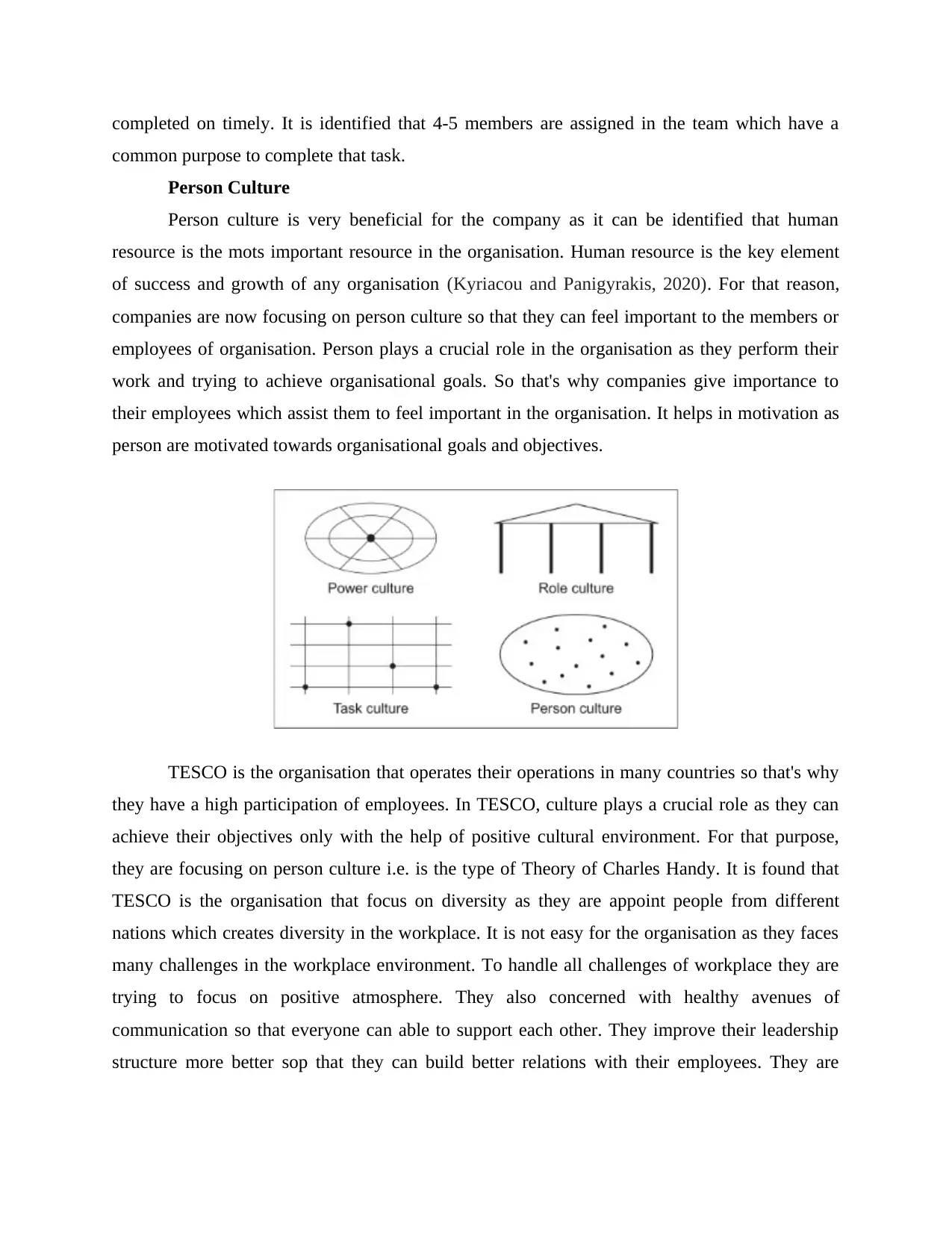
completed on timely. It is identified that 4-5 members are assigned in the team which have a
common purpose to complete that task.
Person Culture
Person culture is very beneficial for the company as it can be identified that human
resource is the mots important resource in the organisation. Human resource is the key element
of success and growth of any organisation (Kyriacou and Panigyrakis, 2020). For that reason,
companies are now focusing on person culture so that they can feel important to the members or
employees of organisation. Person plays a crucial role in the organisation as they perform their
work and trying to achieve organisational goals. So that's why companies give importance to
their employees which assist them to feel important in the organisation. It helps in motivation as
person are motivated towards organisational goals and objectives.
TESCO is the organisation that operates their operations in many countries so that's why
they have a high participation of employees. In TESCO, culture plays a crucial role as they can
achieve their objectives only with the help of positive cultural environment. For that purpose,
they are focusing on person culture i.e. is the type of Theory of Charles Handy. It is found that
TESCO is the organisation that focus on diversity as they are appoint people from different
nations which creates diversity in the workplace. It is not easy for the organisation as they faces
many challenges in the workplace environment. To handle all challenges of workplace they are
trying to focus on positive atmosphere. They also concerned with healthy avenues of
communication so that everyone can able to support each other. They improve their leadership
structure more better sop that they can build better relations with their employees. They are
common purpose to complete that task.
Person Culture
Person culture is very beneficial for the company as it can be identified that human
resource is the mots important resource in the organisation. Human resource is the key element
of success and growth of any organisation (Kyriacou and Panigyrakis, 2020). For that reason,
companies are now focusing on person culture so that they can feel important to the members or
employees of organisation. Person plays a crucial role in the organisation as they perform their
work and trying to achieve organisational goals. So that's why companies give importance to
their employees which assist them to feel important in the organisation. It helps in motivation as
person are motivated towards organisational goals and objectives.
TESCO is the organisation that operates their operations in many countries so that's why
they have a high participation of employees. In TESCO, culture plays a crucial role as they can
achieve their objectives only with the help of positive cultural environment. For that purpose,
they are focusing on person culture i.e. is the type of Theory of Charles Handy. It is found that
TESCO is the organisation that focus on diversity as they are appoint people from different
nations which creates diversity in the workplace. It is not easy for the organisation as they faces
many challenges in the workplace environment. To handle all challenges of workplace they are
trying to focus on positive atmosphere. They also concerned with healthy avenues of
communication so that everyone can able to support each other. They improve their leadership
structure more better sop that they can build better relations with their employees. They are
⊘ This is a preview!⊘
Do you want full access?
Subscribe today to unlock all pages.

Trusted by 1+ million students worldwide
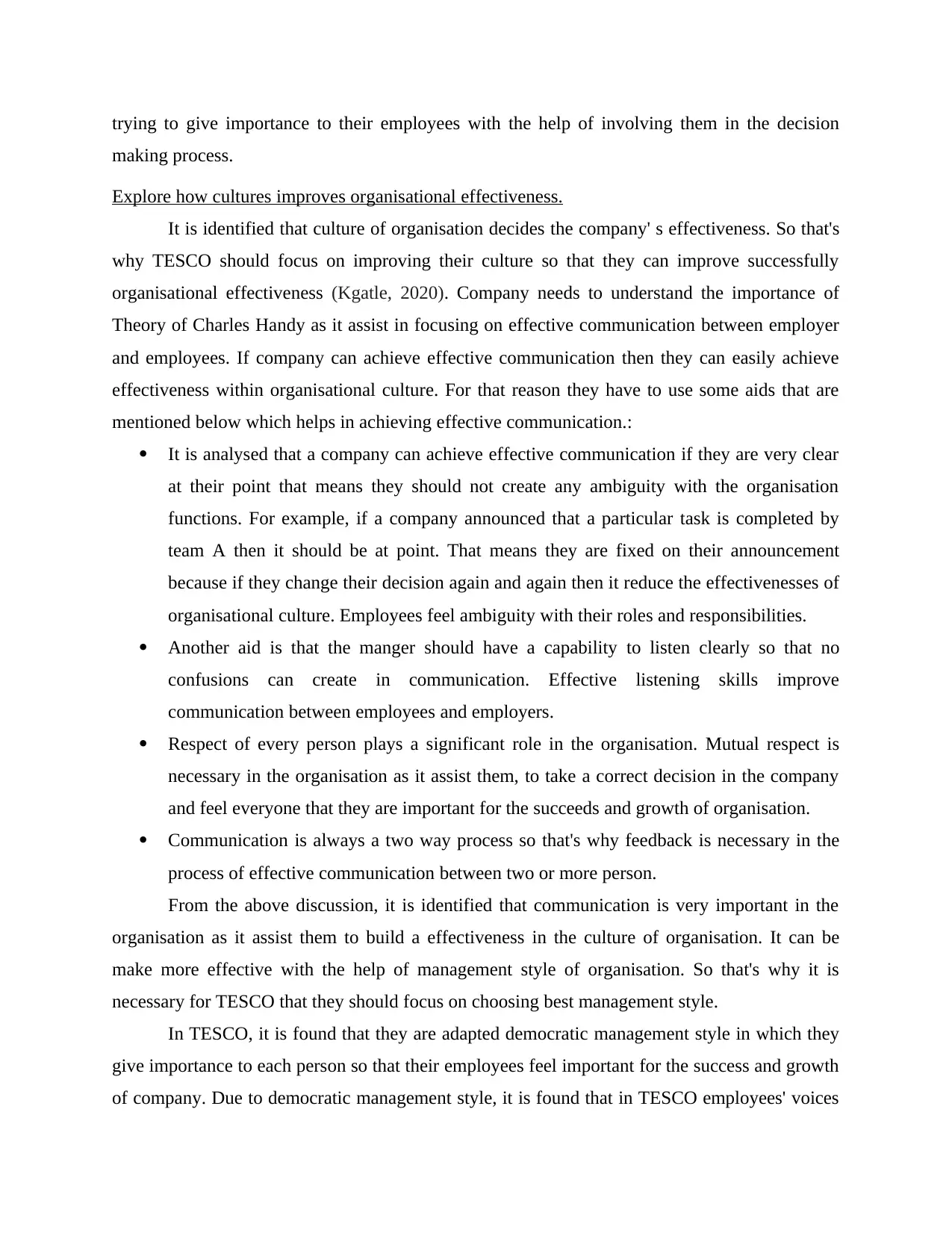
trying to give importance to their employees with the help of involving them in the decision
making process.
Explore how cultures improves organisational effectiveness.
It is identified that culture of organisation decides the company' s effectiveness. So that's
why TESCO should focus on improving their culture so that they can improve successfully
organisational effectiveness (Kgatle, 2020). Company needs to understand the importance of
Theory of Charles Handy as it assist in focusing on effective communication between employer
and employees. If company can achieve effective communication then they can easily achieve
effectiveness within organisational culture. For that reason they have to use some aids that are
mentioned below which helps in achieving effective communication.:
It is analysed that a company can achieve effective communication if they are very clear
at their point that means they should not create any ambiguity with the organisation
functions. For example, if a company announced that a particular task is completed by
team A then it should be at point. That means they are fixed on their announcement
because if they change their decision again and again then it reduce the effectivenesses of
organisational culture. Employees feel ambiguity with their roles and responsibilities.
Another aid is that the manger should have a capability to listen clearly so that no
confusions can create in communication. Effective listening skills improve
communication between employees and employers.
Respect of every person plays a significant role in the organisation. Mutual respect is
necessary in the organisation as it assist them, to take a correct decision in the company
and feel everyone that they are important for the succeeds and growth of organisation.
Communication is always a two way process so that's why feedback is necessary in the
process of effective communication between two or more person.
From the above discussion, it is identified that communication is very important in the
organisation as it assist them to build a effectiveness in the culture of organisation. It can be
make more effective with the help of management style of organisation. So that's why it is
necessary for TESCO that they should focus on choosing best management style.
In TESCO, it is found that they are adapted democratic management style in which they
give importance to each person so that their employees feel important for the success and growth
of company. Due to democratic management style, it is found that in TESCO employees' voices
making process.
Explore how cultures improves organisational effectiveness.
It is identified that culture of organisation decides the company' s effectiveness. So that's
why TESCO should focus on improving their culture so that they can improve successfully
organisational effectiveness (Kgatle, 2020). Company needs to understand the importance of
Theory of Charles Handy as it assist in focusing on effective communication between employer
and employees. If company can achieve effective communication then they can easily achieve
effectiveness within organisational culture. For that reason they have to use some aids that are
mentioned below which helps in achieving effective communication.:
It is analysed that a company can achieve effective communication if they are very clear
at their point that means they should not create any ambiguity with the organisation
functions. For example, if a company announced that a particular task is completed by
team A then it should be at point. That means they are fixed on their announcement
because if they change their decision again and again then it reduce the effectivenesses of
organisational culture. Employees feel ambiguity with their roles and responsibilities.
Another aid is that the manger should have a capability to listen clearly so that no
confusions can create in communication. Effective listening skills improve
communication between employees and employers.
Respect of every person plays a significant role in the organisation. Mutual respect is
necessary in the organisation as it assist them, to take a correct decision in the company
and feel everyone that they are important for the succeeds and growth of organisation.
Communication is always a two way process so that's why feedback is necessary in the
process of effective communication between two or more person.
From the above discussion, it is identified that communication is very important in the
organisation as it assist them to build a effectiveness in the culture of organisation. It can be
make more effective with the help of management style of organisation. So that's why it is
necessary for TESCO that they should focus on choosing best management style.
In TESCO, it is found that they are adapted democratic management style in which they
give importance to each person so that their employees feel important for the success and growth
of company. Due to democratic management style, it is found that in TESCO employees' voices
Paraphrase This Document
Need a fresh take? Get an instant paraphrase of this document with our AI Paraphraser
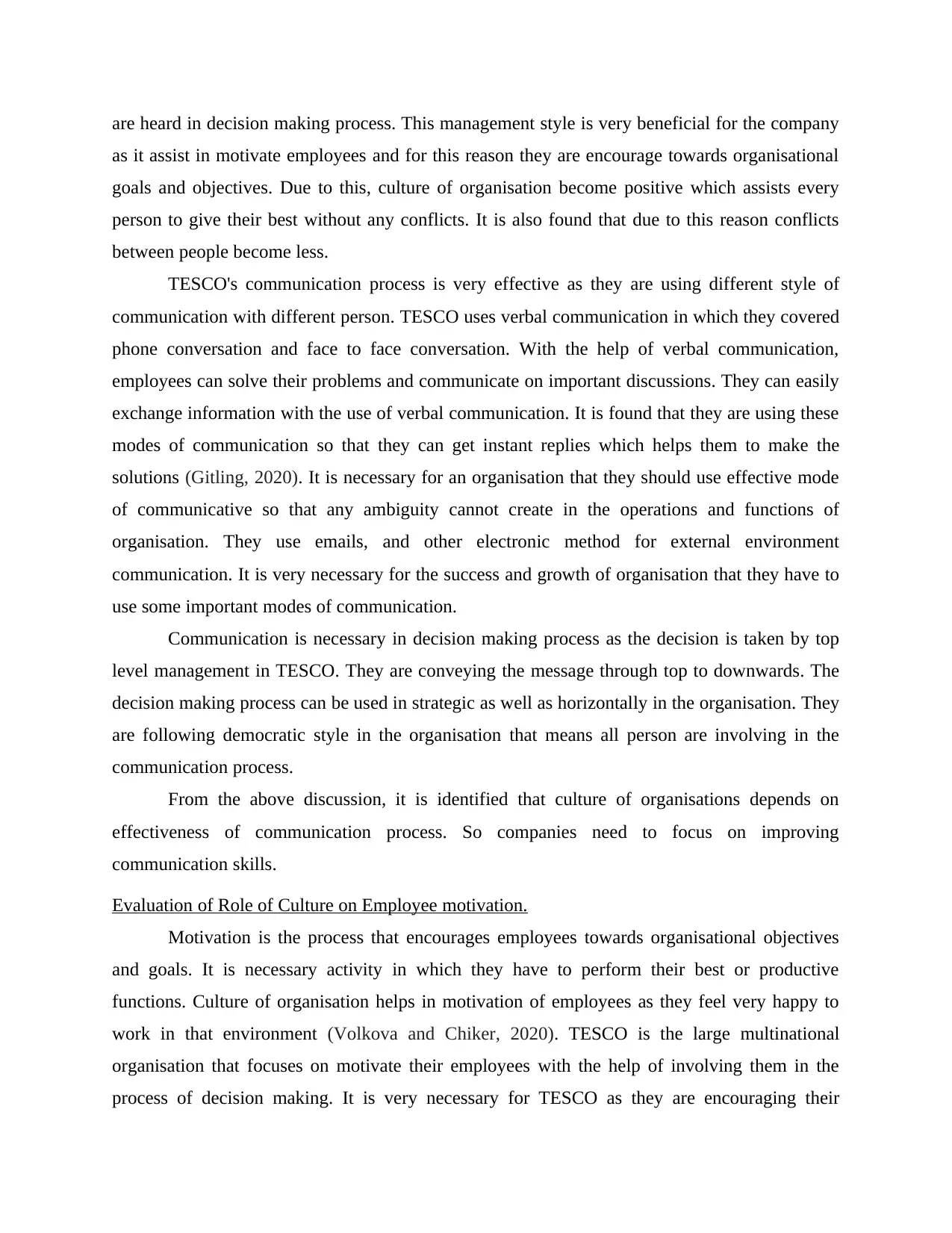
are heard in decision making process. This management style is very beneficial for the company
as it assist in motivate employees and for this reason they are encourage towards organisational
goals and objectives. Due to this, culture of organisation become positive which assists every
person to give their best without any conflicts. It is also found that due to this reason conflicts
between people become less.
TESCO's communication process is very effective as they are using different style of
communication with different person. TESCO uses verbal communication in which they covered
phone conversation and face to face conversation. With the help of verbal communication,
employees can solve their problems and communicate on important discussions. They can easily
exchange information with the use of verbal communication. It is found that they are using these
modes of communication so that they can get instant replies which helps them to make the
solutions (Gitling, 2020). It is necessary for an organisation that they should use effective mode
of communicative so that any ambiguity cannot create in the operations and functions of
organisation. They use emails, and other electronic method for external environment
communication. It is very necessary for the success and growth of organisation that they have to
use some important modes of communication.
Communication is necessary in decision making process as the decision is taken by top
level management in TESCO. They are conveying the message through top to downwards. The
decision making process can be used in strategic as well as horizontally in the organisation. They
are following democratic style in the organisation that means all person are involving in the
communication process.
From the above discussion, it is identified that culture of organisations depends on
effectiveness of communication process. So companies need to focus on improving
communication skills.
Evaluation of Role of Culture on Employee motivation.
Motivation is the process that encourages employees towards organisational objectives
and goals. It is necessary activity in which they have to perform their best or productive
functions. Culture of organisation helps in motivation of employees as they feel very happy to
work in that environment (Volkova and Chiker, 2020). TESCO is the large multinational
organisation that focuses on motivate their employees with the help of involving them in the
process of decision making. It is very necessary for TESCO as they are encouraging their
as it assist in motivate employees and for this reason they are encourage towards organisational
goals and objectives. Due to this, culture of organisation become positive which assists every
person to give their best without any conflicts. It is also found that due to this reason conflicts
between people become less.
TESCO's communication process is very effective as they are using different style of
communication with different person. TESCO uses verbal communication in which they covered
phone conversation and face to face conversation. With the help of verbal communication,
employees can solve their problems and communicate on important discussions. They can easily
exchange information with the use of verbal communication. It is found that they are using these
modes of communication so that they can get instant replies which helps them to make the
solutions (Gitling, 2020). It is necessary for an organisation that they should use effective mode
of communicative so that any ambiguity cannot create in the operations and functions of
organisation. They use emails, and other electronic method for external environment
communication. It is very necessary for the success and growth of organisation that they have to
use some important modes of communication.
Communication is necessary in decision making process as the decision is taken by top
level management in TESCO. They are conveying the message through top to downwards. The
decision making process can be used in strategic as well as horizontally in the organisation. They
are following democratic style in the organisation that means all person are involving in the
communication process.
From the above discussion, it is identified that culture of organisations depends on
effectiveness of communication process. So companies need to focus on improving
communication skills.
Evaluation of Role of Culture on Employee motivation.
Motivation is the process that encourages employees towards organisational objectives
and goals. It is necessary activity in which they have to perform their best or productive
functions. Culture of organisation helps in motivation of employees as they feel very happy to
work in that environment (Volkova and Chiker, 2020). TESCO is the large multinational
organisation that focuses on motivate their employees with the help of involving them in the
process of decision making. It is very necessary for TESCO as they are encouraging their
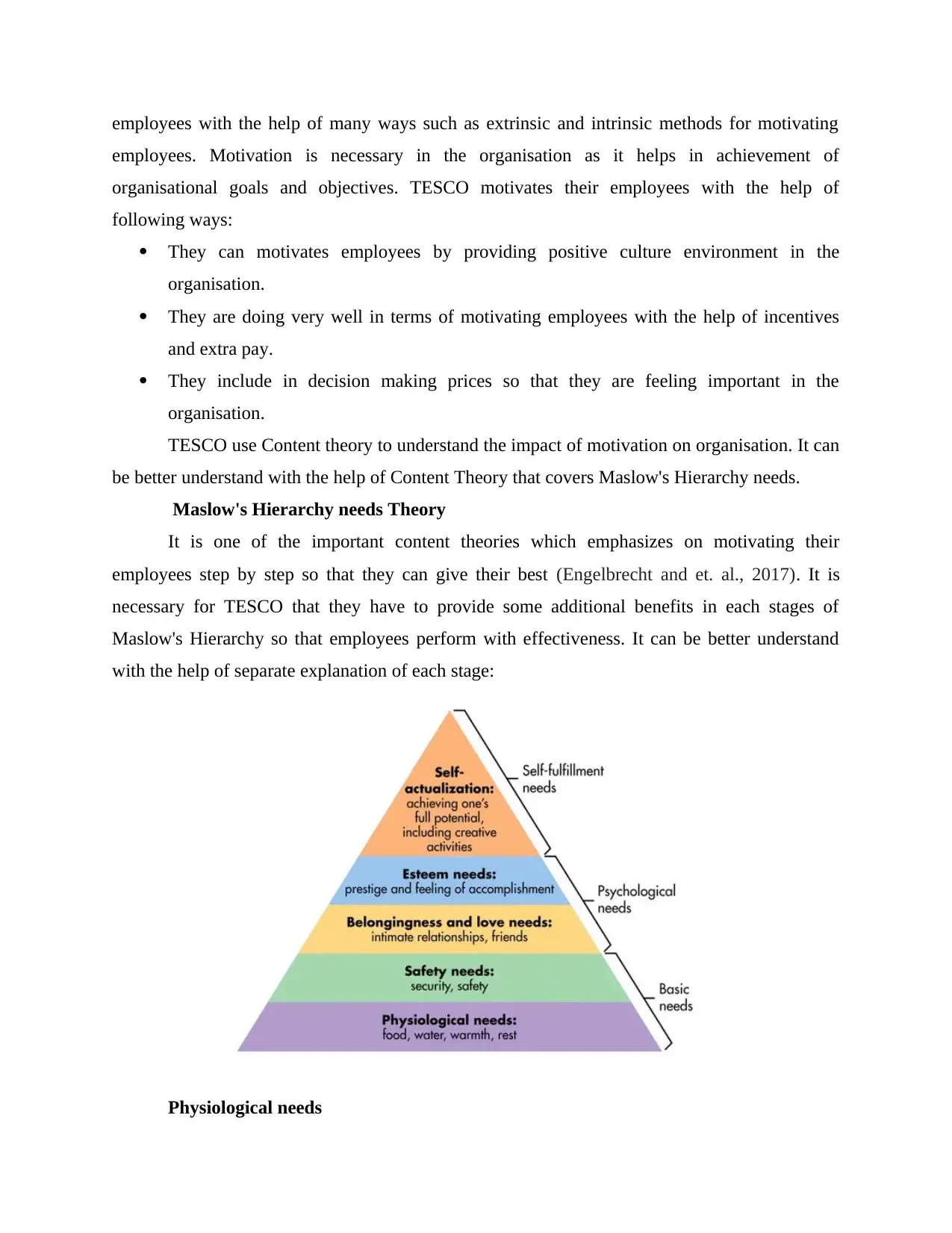
employees with the help of many ways such as extrinsic and intrinsic methods for motivating
employees. Motivation is necessary in the organisation as it helps in achievement of
organisational goals and objectives. TESCO motivates their employees with the help of
following ways:
They can motivates employees by providing positive culture environment in the
organisation.
They are doing very well in terms of motivating employees with the help of incentives
and extra pay.
They include in decision making prices so that they are feeling important in the
organisation.
TESCO use Content theory to understand the impact of motivation on organisation. It can
be better understand with the help of Content Theory that covers Maslow's Hierarchy needs.
Maslow's Hierarchy needs Theory
It is one of the important content theories which emphasizes on motivating their
employees step by step so that they can give their best (Engelbrecht and et. al., 2017). It is
necessary for TESCO that they have to provide some additional benefits in each stages of
Maslow's Hierarchy so that employees perform with effectiveness. It can be better understand
with the help of separate explanation of each stage:
Physiological needs
employees. Motivation is necessary in the organisation as it helps in achievement of
organisational goals and objectives. TESCO motivates their employees with the help of
following ways:
They can motivates employees by providing positive culture environment in the
organisation.
They are doing very well in terms of motivating employees with the help of incentives
and extra pay.
They include in decision making prices so that they are feeling important in the
organisation.
TESCO use Content theory to understand the impact of motivation on organisation. It can
be better understand with the help of Content Theory that covers Maslow's Hierarchy needs.
Maslow's Hierarchy needs Theory
It is one of the important content theories which emphasizes on motivating their
employees step by step so that they can give their best (Engelbrecht and et. al., 2017). It is
necessary for TESCO that they have to provide some additional benefits in each stages of
Maslow's Hierarchy so that employees perform with effectiveness. It can be better understand
with the help of separate explanation of each stage:
Physiological needs
⊘ This is a preview!⊘
Do you want full access?
Subscribe today to unlock all pages.

Trusted by 1+ million students worldwide
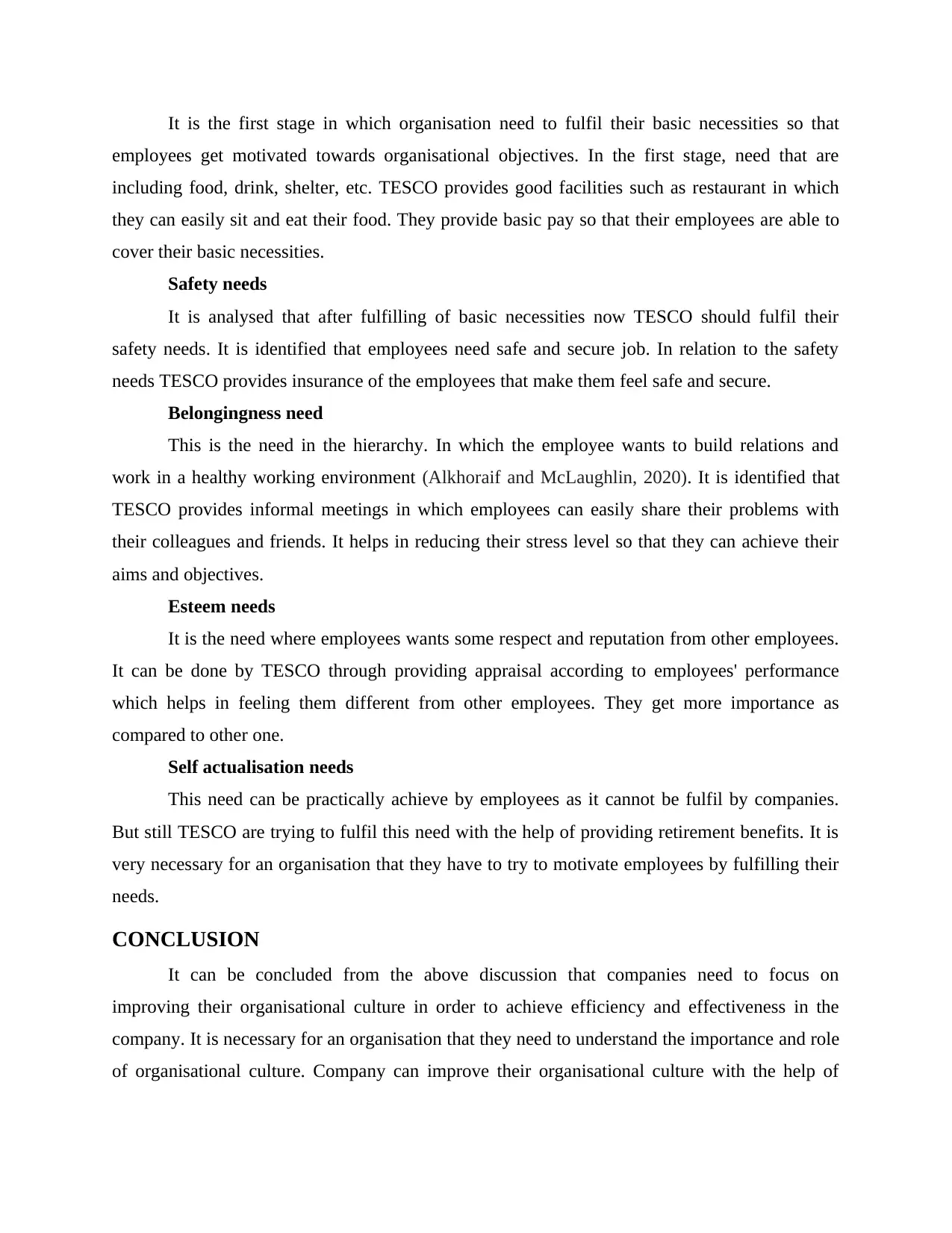
It is the first stage in which organisation need to fulfil their basic necessities so that
employees get motivated towards organisational objectives. In the first stage, need that are
including food, drink, shelter, etc. TESCO provides good facilities such as restaurant in which
they can easily sit and eat their food. They provide basic pay so that their employees are able to
cover their basic necessities.
Safety needs
It is analysed that after fulfilling of basic necessities now TESCO should fulfil their
safety needs. It is identified that employees need safe and secure job. In relation to the safety
needs TESCO provides insurance of the employees that make them feel safe and secure.
Belongingness need
This is the need in the hierarchy. In which the employee wants to build relations and
work in a healthy working environment (Alkhoraif and McLaughlin, 2020). It is identified that
TESCO provides informal meetings in which employees can easily share their problems with
their colleagues and friends. It helps in reducing their stress level so that they can achieve their
aims and objectives.
Esteem needs
It is the need where employees wants some respect and reputation from other employees.
It can be done by TESCO through providing appraisal according to employees' performance
which helps in feeling them different from other employees. They get more importance as
compared to other one.
Self actualisation needs
This need can be practically achieve by employees as it cannot be fulfil by companies.
But still TESCO are trying to fulfil this need with the help of providing retirement benefits. It is
very necessary for an organisation that they have to try to motivate employees by fulfilling their
needs.
CONCLUSION
It can be concluded from the above discussion that companies need to focus on
improving their organisational culture in order to achieve efficiency and effectiveness in the
company. It is necessary for an organisation that they need to understand the importance and role
of organisational culture. Company can improve their organisational culture with the help of
employees get motivated towards organisational objectives. In the first stage, need that are
including food, drink, shelter, etc. TESCO provides good facilities such as restaurant in which
they can easily sit and eat their food. They provide basic pay so that their employees are able to
cover their basic necessities.
Safety needs
It is analysed that after fulfilling of basic necessities now TESCO should fulfil their
safety needs. It is identified that employees need safe and secure job. In relation to the safety
needs TESCO provides insurance of the employees that make them feel safe and secure.
Belongingness need
This is the need in the hierarchy. In which the employee wants to build relations and
work in a healthy working environment (Alkhoraif and McLaughlin, 2020). It is identified that
TESCO provides informal meetings in which employees can easily share their problems with
their colleagues and friends. It helps in reducing their stress level so that they can achieve their
aims and objectives.
Esteem needs
It is the need where employees wants some respect and reputation from other employees.
It can be done by TESCO through providing appraisal according to employees' performance
which helps in feeling them different from other employees. They get more importance as
compared to other one.
Self actualisation needs
This need can be practically achieve by employees as it cannot be fulfil by companies.
But still TESCO are trying to fulfil this need with the help of providing retirement benefits. It is
very necessary for an organisation that they have to try to motivate employees by fulfilling their
needs.
CONCLUSION
It can be concluded from the above discussion that companies need to focus on
improving their organisational culture in order to achieve efficiency and effectiveness in the
company. It is necessary for an organisation that they need to understand the importance and role
of organisational culture. Company can improve their organisational culture with the help of
Paraphrase This Document
Need a fresh take? Get an instant paraphrase of this document with our AI Paraphraser
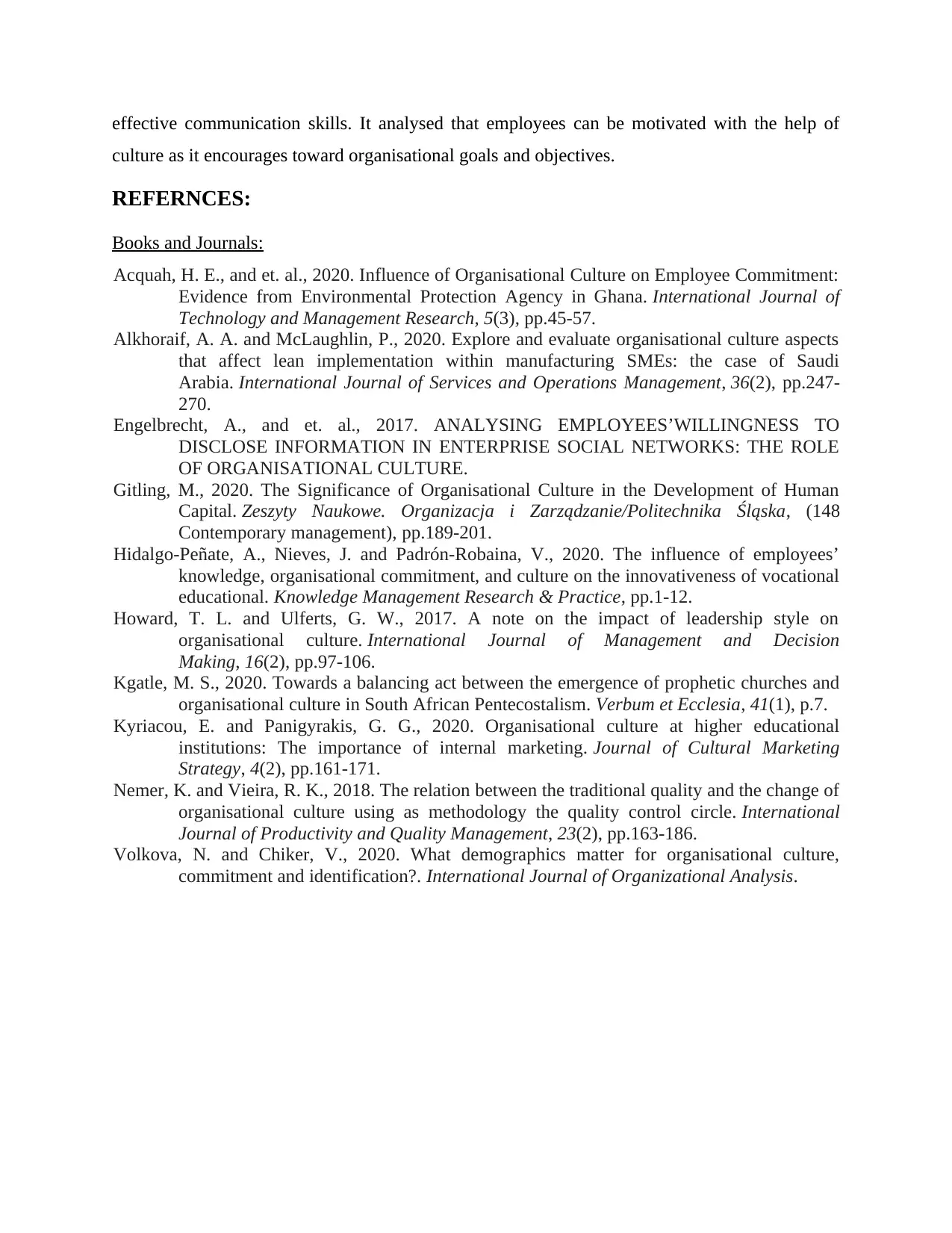
effective communication skills. It analysed that employees can be motivated with the help of
culture as it encourages toward organisational goals and objectives.
REFERNCES:
Books and Journals:
Acquah, H. E., and et. al., 2020. Influence of Organisational Culture on Employee Commitment:
Evidence from Environmental Protection Agency in Ghana. International Journal of
Technology and Management Research, 5(3), pp.45-57.
Alkhoraif, A. A. and McLaughlin, P., 2020. Explore and evaluate organisational culture aspects
that affect lean implementation within manufacturing SMEs: the case of Saudi
Arabia. International Journal of Services and Operations Management, 36(2), pp.247-
270.
Engelbrecht, A., and et. al., 2017. ANALYSING EMPLOYEES’WILLINGNESS TO
DISCLOSE INFORMATION IN ENTERPRISE SOCIAL NETWORKS: THE ROLE
OF ORGANISATIONAL CULTURE.
Gitling, M., 2020. The Significance of Organisational Culture in the Development of Human
Capital. Zeszyty Naukowe. Organizacja i Zarządzanie/Politechnika Śląska, (148
Contemporary management), pp.189-201.
Hidalgo-Peñate, A., Nieves, J. and Padrón-Robaina, V., 2020. The influence of employees’
knowledge, organisational commitment, and culture on the innovativeness of vocational
educational. Knowledge Management Research & Practice, pp.1-12.
Howard, T. L. and Ulferts, G. W., 2017. A note on the impact of leadership style on
organisational culture. International Journal of Management and Decision
Making, 16(2), pp.97-106.
Kgatle, M. S., 2020. Towards a balancing act between the emergence of prophetic churches and
organisational culture in South African Pentecostalism. Verbum et Ecclesia, 41(1), p.7.
Kyriacou, E. and Panigyrakis, G. G., 2020. Organisational culture at higher educational
institutions: The importance of internal marketing. Journal of Cultural Marketing
Strategy, 4(2), pp.161-171.
Nemer, K. and Vieira, R. K., 2018. The relation between the traditional quality and the change of
organisational culture using as methodology the quality control circle. International
Journal of Productivity and Quality Management, 23(2), pp.163-186.
Volkova, N. and Chiker, V., 2020. What demographics matter for organisational culture,
commitment and identification?. International Journal of Organizational Analysis.
culture as it encourages toward organisational goals and objectives.
REFERNCES:
Books and Journals:
Acquah, H. E., and et. al., 2020. Influence of Organisational Culture on Employee Commitment:
Evidence from Environmental Protection Agency in Ghana. International Journal of
Technology and Management Research, 5(3), pp.45-57.
Alkhoraif, A. A. and McLaughlin, P., 2020. Explore and evaluate organisational culture aspects
that affect lean implementation within manufacturing SMEs: the case of Saudi
Arabia. International Journal of Services and Operations Management, 36(2), pp.247-
270.
Engelbrecht, A., and et. al., 2017. ANALYSING EMPLOYEES’WILLINGNESS TO
DISCLOSE INFORMATION IN ENTERPRISE SOCIAL NETWORKS: THE ROLE
OF ORGANISATIONAL CULTURE.
Gitling, M., 2020. The Significance of Organisational Culture in the Development of Human
Capital. Zeszyty Naukowe. Organizacja i Zarządzanie/Politechnika Śląska, (148
Contemporary management), pp.189-201.
Hidalgo-Peñate, A., Nieves, J. and Padrón-Robaina, V., 2020. The influence of employees’
knowledge, organisational commitment, and culture on the innovativeness of vocational
educational. Knowledge Management Research & Practice, pp.1-12.
Howard, T. L. and Ulferts, G. W., 2017. A note on the impact of leadership style on
organisational culture. International Journal of Management and Decision
Making, 16(2), pp.97-106.
Kgatle, M. S., 2020. Towards a balancing act between the emergence of prophetic churches and
organisational culture in South African Pentecostalism. Verbum et Ecclesia, 41(1), p.7.
Kyriacou, E. and Panigyrakis, G. G., 2020. Organisational culture at higher educational
institutions: The importance of internal marketing. Journal of Cultural Marketing
Strategy, 4(2), pp.161-171.
Nemer, K. and Vieira, R. K., 2018. The relation between the traditional quality and the change of
organisational culture using as methodology the quality control circle. International
Journal of Productivity and Quality Management, 23(2), pp.163-186.
Volkova, N. and Chiker, V., 2020. What demographics matter for organisational culture,
commitment and identification?. International Journal of Organizational Analysis.
1 out of 11
Related Documents
Your All-in-One AI-Powered Toolkit for Academic Success.
+13062052269
info@desklib.com
Available 24*7 on WhatsApp / Email
![[object Object]](/_next/static/media/star-bottom.7253800d.svg)
Unlock your academic potential
Copyright © 2020–2025 A2Z Services. All Rights Reserved. Developed and managed by ZUCOL.




